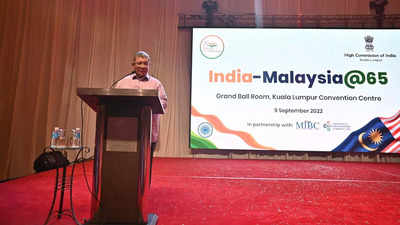- News
- India News
- Frosty times behind, India Malaysia @65 celebrate historical ties
Trending
This story is from September 11, 2022
Frosty times behind, India Malaysia @65 celebrate historical ties
Foreign affairs minister of Malaysia, Saifuddin Abdullah, called the two nations’ ties as “civilizational” at the special commemorative event held in Kuala Lumpur to mark 65 years of diplomatic relations between the two nations.

Fondly recalling his recent trip to India, and referring to external affairs minister Jaishankar as “brother” at the start of his key-note speech before an impressive gathering of guests comprising parliamentarians, industrialists, ambassadors and academia, Saifuddin said, “for people of both nations it is not just bilateral ties, rather it is a civilizational one.”
Later, expanding on this thought, Saifuddin spoke to TOI and said, “Both Malaysia and India present positive examples of multi-racial society and diversity to the world and this has been our connect as well as strength.” In our next meeting, I am keen to further discuss with Jaishankar how promoting our peaceful co-existence philosophy is instrumental in the overall growth of our nations,” he added.

On the trade front, things are looking up. Bilateral trade at US$20Bn saw a significant 34% jump from last year, despite the pandemic. The Indian High Commission and the Consortium of Indian Industries in Malaysia (CIIM), along with Malaysia Indian Business Council (MIBC), which jointly organized this kick-off event to give a strategic push to the huge investment potentials, are upbeat.
Umang Sharma, Chairman CIIM, said, “Malaysia’s digital initiative and India’s Make in India measure can be a win-win for both nations and a bilateral trade volume of US$30 billion by 2030 looks very achievable.”
End of Article
FOLLOW US ON SOCIAL MEDIA










